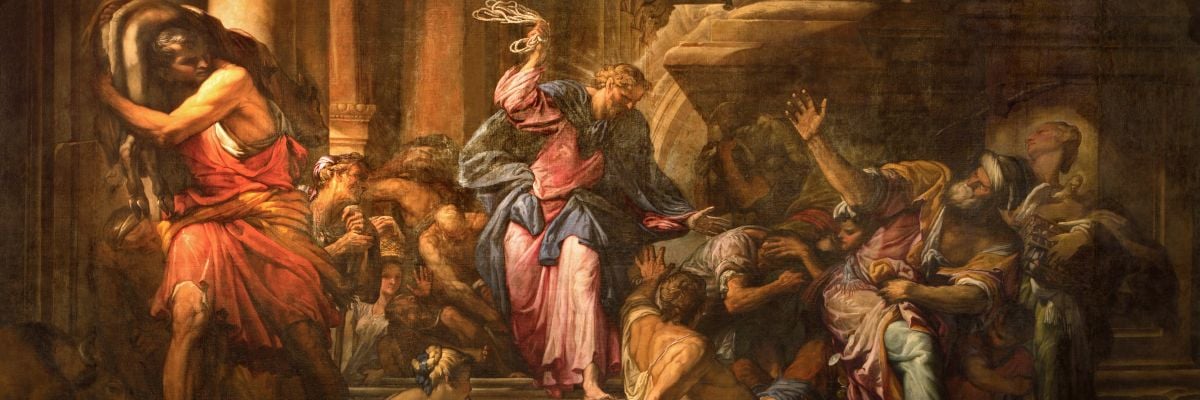
Jesus appeared to engage in rioting when he made a whip of cords and drove out the moneychangers from the temple in Jerusalem. Does that mean it’s okay to riot and loot businesses to protest the murder of George Floyd? Trent Horn explains why the two situations are completely different.
Transcript:
Host: Go ahead with your question for Trent.
Caller: Yeah, my question is: what’s the best way to explain these riots and stuff, with the looting and everything, when Jesus came to the temple and overturned tables, grabbed the cord, chasing people out…how can we separate….
Trent: So is your question: some people say—right, so are you saying that some people say that because Jesus tipped over the tables of the moneychangers and engaged in violence against them—it just says he made a whip of cords and drew them out, it doesn’t say that he inflicted violence on their persons, per se, but he may have, he certainly inflicted violence on their tables, he might have broken certain things in driving them out of the temple—is the question that, because Jesus flipped over the tables of the moneychangers and drove them out, that because Jesus did that, why can’t people engage in riots and looting today if Jesus started a little riot in the temple 2,000 years ago? Is that kind of the nut of the objection?
Caller: Yeah, sort of, because my account on Facebook, a family member posted a painting of Jesus flipping a table, and she’s all “Here’s for my religious folks,” you know, kind of expressing what’s happening right now, she’s kinda not…she doesn’t read the Bible…
Trent: Yeah, and I would say this is a bad argument, saying: “Here, Jesus destroyed property here, therefore it’s always okay to destroy property, including in the looting that is taking place during these protests related to the killing of George Floyd.”
That’s a bad argument. That would be like saying, “Well here’s a police officer who killed George Floyd—” and I know there hasn’t been a trial yet, but let’s just assume for the sake of the argument that that was an unlawful, unjustified killing, and for all intents and purposes, it appears to be an unjustified use of force that led to manslaughter and the unjustified death of another human being—that’d be like saying, “Well, look, here is a picture of a soldier killing someone in in wartime, so therefore this police officer could kill someone.” Just because killing is okay in some contexts doesn’t mean it’s okay in all contexts. Likewise, just because destroying property is okay in some contexts, it doesn’t mean it’s okay in all contexts.
So I would say, well, what are the differences between Jesus driving out the moneychangers and the looting that is going on in the riots that have happened? These are—when looting occurs, we don’t have a peaceful protest anymore, we have a riot. What’s the difference?
Number one: the reason that Jesus overturned the tables and drove out the moneychangers was because what they were doing was wrong. They should not have been turning a sacred place in the temple into a place of commercial activity. Notice that Jesus did not go outside of the temple and then continue to tear apart the many shops that were in Jerusalem. He didn’t do that, he just said “It’s wrong for you to be doing this here in my Father’s house.” So if anything, Jesus was defending his own property against people who were unlawfully there.
So when people bring up that example of Jesus turning over the tables, it doesn’t correspond with the looters; it would correspond more with property owners using force to repel those who are unlawfully there. So actually, the argument of Jesus flipping over the tables does not support the looters—it supports the right of shop owners to use proportionate force to defend their property from people who are unlawfully there and are violating that space. So Jesus was defending his Father’s house and the space that was being violated. He didn’t go out and just, in a righteous anger, attack innocent businesses in Jerusalem or traders or merchants that had nothing to do with what was going on.
Also another point: Jesus didn’t take the money from the moneychangers and keep it and then run off and do whatever he darn well pleased with it. The looters are taking property and keeping it to enrich themselves.
I mean, I would say it really does annoy me when people will see this activity and try to condone all of this violence against innocent people by saying these are individuals who are just aggrieved about racial injustice. And that’s not true, I’ve seen interviews with people, with looters who’ve been arrested, who said they barely heard about the killing of George Floyd, and they just wanted to get free money. They wanted stuff. A lot of these people, I think, are criminals. They’re people who normally would operate as criminals in the dark secretly, and have now had a chance to come to the light.
I mean, everyone condemns what’s going on with the looting. It amazes me there are some people who still won’t condemn this. It’s condemned by the leaders of the Black Lives Matter movement, it’s condemned by George Floyd’s family, it’s been condemned by political figures who are sympathetic to this; everyone realizes you ought to peacefully protest against police brutality and against racism. That is obvious. But nothing justifies looting and destroying the livelihoods of stores, many of which, in these instances, are stores that are owned by persons of color who are already members of marginalized communities! So it really does confound me a bit.
But is that a helpful reply, Noah?
Caller: That’s very helpful. I pretty much answered that already towards her post, but at the end, she just said, “Well, my point is that he was angry.”
Trent: Right, and you could say to her: “Does being angry mean it’s always okay to hurt other people?” No, of course not.
Being angry—you could say, “Yeah, it’s okay for Jesus to tell people ‘Get out of my Father’s house with your sacrilegious practices,'” but—and so it’s okay to be angry. Paul’s letter to the Ephesians, in his letter to the Ephesians, he says “Be angry, but don’t let the sun set on your anger.” So it’s okay to be angry, to have a righteous anger; but it’s not okay to fall into the sin of anger and vengeance and go out and hurt innocent people. And that just can’t be justified.
And you could say to her, “Would it be….” who are you speaking with about this? Did you say it was a relative?
Caller: Yes.
Trent: Okay, you could ask her: “Would it be okay for someone, because they’re angry about the killing of George Floyd, would it be okay for them to break into your house and take your stuff and hurt or kill you?” Obviously, if it would be wrong, if you would be outraged at them doing that to you, you should be outraged at them doing that to other people.
So I would just recommend saying that to them, and also I recommend my new podcast episode that just came out, just go to trenthornpodcast.com, though you can listen to it for free at iTunes, Google Play, just search for the Counsel of Trent, C-O-U-N-S-E-L, and just go the most recent episode that’s come out, it’s called “Racism, Riots, and a Catholic Response.” You can get it at Counsel of Trent on the iTunes app, or it’s available at Catholic.com as well.



